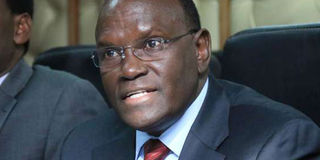Shame on Uhuru and doctors: You have blood on your hands

Health Cabinet Secretary Cleopa Mailu addresses the media at Afya House on December 7, 2016. Doctors want their grievances addressed. PHOTO | JEFF ANGOTE | NATION MEDIA GROUP
What you need to know:
- Treasury must surely have a plan on how to meet the pay obligations that government commits itself to.
- The president, the cabinet secretary for Health and the doctors and nurses all have the blood of innocents on their hands.
Shame on you, Dr Cleopa Mailu. You have very few duties now that most of the Health ministry’s roles were devolved.
So how could you not see this coming? Where were you when the doctors issued their strike notice?
What use is it for the ministry to now say it “deeply regrets” the situation when so many lives have been lost?
Shame on you as well, President Uhuru Kenyatta. You are the nation’s chief executive.
You are sworn to protect the lives of Kenyans. How could you treat something as serious as the strike by doctors and nurses so casually?
It is your government that signed the Collective Bargaining Agreement with the doctors union after long months of painstaking negotiations.
Treasury must surely have a plan on how to meet the pay obligations that government commits itself to.
Even if there really isn’t enough money to meet the doctors’ full demands, a call to the union officials for talks at State House would almost certainly have averted the strike.
A show of good faith by the president is all that was needed.
Just using the prestige of that office to bring the parties together would have saved the lives of so many innocents.
The president has lamentably failed all those poor Kenyans that have lost their lives over the last few days – and his decision to go around campaigning at such a time is an insult to taxpayers.
And yes. Shame on you, doctors and nurses, as well.
It is fashionable in certain quarters to support every strike because it is seen as making a dent on the sitting government’s popularity. I won’t join that bandwagon, doctors.
The role you play in society puts you in a unique position.
Your presence in hospitals means the difference between life and death for patients.
It is true that your demands for better pay are well grounded and most Kenyans support them.
CHANGE TACT
But you should find a different way of expressing those grievances than launching an all-out strike, which results in so many preventable deaths.
Junior doctors in England, for example, have been agitating for better pay for some time.
But in September, their leader Dr Ellen McCourt issued this statement to explain a decision to postpone their planned strike: “Patient safety remains doctors’ primary concern.
"While the (union) provided more than the required notice, we have taken this decision (to postpone the strike) to ensure the National Health Service has the necessary time to prepare and to put in place contingency plans to protect patient safety.”
In the UK, they also strike in a different way, with doctors withdrawing their services for a few hours a day rather than taking off from their stations entirely.
Kenyan doctors would have won more popular support if they had begun with half-day strikes for a week before eventually withdrawing their services entirely.
As it stands, the doctors and nurses have blood on their hands just as the politicians do.
At the end of the day, the victims of this strike are not the middle class types on Twitter or even the politicians who simply do not care.
The victims are the millions of Kenyans that do not have the funds to go to private hospitals.
The president, the cabinet secretary for Health and the doctors and nurses all have the blood of innocents on their hands.
***
There is something special about Ghanaians.
Before the most recent election, no president had failed to attain a second term.
Nothing tests a young democracy more than the defeat of an incumbent at the ballot box.
This is precisely what happened when John Mahama lost to his rival, Nana Akufo-Addo on Friday.
Both men reacted with exceptional grace. Mahama called his rival and gave a generous message of congratulations.
Akufo-Addo was similarly gracious, urging the nation to come together and calling on his supporters not to engage in triumphalism.
It was a fine moment for African democracy coming just over a year after Goodluck Jonathan similarly exited the presidency in Nigeria.
The parallels between Kenya and Ghana are striking.
There will be a lot of analysis of why Mahama lost and whether the opposition can pull off its own victory in Kenya.
The issues in the Ghanaian election, especially public sector corruption and a faltering economy were also very familiar.
The bigger puzzle Kenyans should resolve, though, is why national politics does not attract the type of dignified, well-spoken, articulate and graceful politicians that run for office in Ghana.
[email protected] @mutigam





